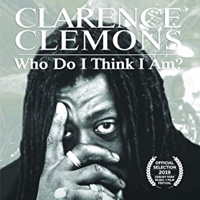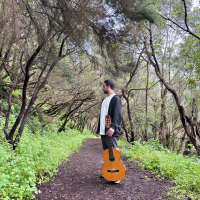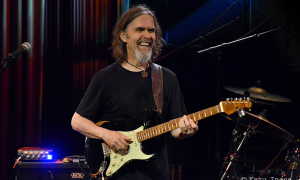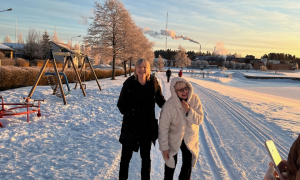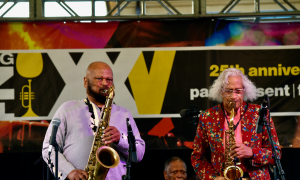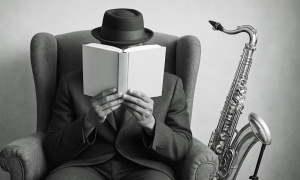Home » Jazz Articles » SoCal Jazz » Alan Pasqua: Keys That Unlock Many Doors
Alan Pasqua: Keys That Unlock Many Doors
AP: Exactly, and some guys never really get or understand that.
AAJ: It can just get cluttered.
AP: Yes, most of the time less is more.
AAJ: Peter Erskine and Tony Williams. Two of the greatest jazz drummers of all time. You have had the opportunity to play with both. Two very contrasting styles.
AP: Yes, for sure. There is definitely more than one way to get it done. But you know, there are actually more similarities than one might think. Both absolute masters at tuning their drums. A lot of people don't understand how important that is. Tony and Peter also very on top of their equipment choices. Both meticulous in their cymbals selection and how they are used.
AAJ: You also find the time to teach at the Thornton School of Music at USC. I know that Erskine and many other top-flight musicians teach there as well. What is it about their program that draws in such upper echelon to their faculty?
AP: I was brought in by Shelly Berg. Shelly had a very keen eye for musicians that were not only good players, but also had the ability to translate what they play. Not everyone has the ability to teach. There are a lot of great players that can't teach because they have never had to spend the time to work at it because they know it intuitively.
AAJ: It came to them so naturally that they don't how to explain it.
AP: They'll play something, and someone will ask what they did on that piece. The guy will just say well, you know. Then it's like, no I don't know, that's why I'm asking (laughing). I think our faculty has the ability to deliver those answers and teach at a high level.
AAJ: Do you find it rewarding? Especially when you see the light go on in a student's eyes?
AP: I do. Playing does one thing and teaching does another. Teaching can be really draining if that's all you do, because it's just your battery being discharged. Playing then recharges it. It's a nice balance between the two. I have realized that being a good teacher makes me a better pianist on every level.
AAJ: Why do you think that is?
AP: Well, a couple of things. For one, it makes me focus on the mechanics. But moreover, it drives improvisation and creativity. I have to decipher on a case by case basis what a student's strength and weaknesses are, and how to improve upon them. I have to demonstrate in order to teach. Sometimes I need to slow it down and break it down. There are some teachers that teach the same improvisational course every year. That's ridiculous. It makes no sense at all. You have different students with different needs. You just can't do it that way. They have a different skill set. You can't possibly be a good teacher with one method that is going to work for all these different students.
AAJ: That seems to make a lot of sense. With improvisation coming from within, it is going to vary.
AP: I always tell them that I am going to help them develop their own unique voice. To do that conceptually, not by everyone playing these chords and now let's all play these. That's kind of teaching licks. I detest that word. I don't allow the word licks in my classroom. It's about harmonies and melodies and learning how to explore them.
AAJ: You mentioned Bill Evans earlier. I wanted to ask about your Twin Bill:Two Piano Music of Bill EvansConversations with Myself(Verve, 1963). You must feel a very strong connection to his music and approach to even think to do that, much less pull it off so masterfully.
AP: I have always had an affinity for Bill and his compositions. His many trios. I grew up ten miles from where he grew up in New Jersey. I saw him play many times in New York as a young boy. He made quite an impact. I liked his approach on his piano trios. I had listened to the Oscar Peterson trio before, but then with Bill, it was just like, what is happening here? Nobody was playing time, but then everybody was playing time.
AAJ: Two different worlds.
AP: Yeah, for sure. I got to work with Paul Motian on one of my records and also with John Patitucci. Bill did his conversations pretty much with other people's music. There were already too many Bill Evans tribute records out there for me to do another one. But then I thought, maybe if I did the conversational piece with his music. That's how that came about. It was not easy.
AAJ: I imagine not. But certainly, a rewarding accomplishment. Terrific records, both Evans's and yours.
AP: Well thanks for that, Jim. I didn't want to, or try to, sound like Bill Evans. There are other recordings out there of people who tried to sound like Bill. I don't see the point in that.
AAJ: Yeah, why not just listen to the Bill Evans record?
AP: Listen to the real deal. Exactly. It took me a while to do it. Figuring out song selections and all that stuff.
AAJ: You, of course, have a baseball bat on the album cover tying the Twin Bill term into the doubleheader reference. Being a huge baseball fan myself, I just have to ask, are you are a baseball fan?
AP: I'm baseball crazy. When I was in Boston, I would go to Fenway Park to see the Red Sox all the time. Those were the days of Oil Can Boyd and Roger Clemens. It was unbelievable. So, I'm a big Boston Red Sox fan.
AAJ: Well you're one up on me after last year's World Series. I'm a lifetime Dodgers fan.
AP: I was a Dodgers fan when I was a kid, Jim. (Sandy) Koufax, (Don) Drysdale, Maury Wills, Willie Davis, Ron Fairly, (John) Roseboro, I know the whole team. When the Mets would play the Dodgers in L.A., the game would start on the east coast at ten or eleven at night. Not on a school night, but on the weekends, I'd be watching baseball until midnight or one o'clock in the morning.
AAJ: I can relate. I would have a transistor radio with the earpiece under my pillow listening to Vin Scully call the game. Yeah mom, I'm in bed. (laughing)
AP: (laughing) Oh man that reminds me of when I used to go see Dave McKenna play piano, both in Boston at the Copley Plaza Hotel and in Cape Cod at the Columns. He always had a transistor radio in his ear while he was playing listening to the Red Sox.
AAJ: That's great. Getting back to music, in the rock world I know you have played with Carlos Santana and John Fogerty, among many others. I must say that it is Bob Dylan that most piques my curiosity. You did two records and two tours with him. What was that experience like? What is Dylan like to be around both on and off stage?
AP: It was a really great experience. I learned a lot from Bob. We would do yearlong tours. Every night we would do two duets with just piano and synthesizer and Bob. I had grown up playing in rock bands as well as playing jazz. Auditions were wild. It was three deep at every instrument. I ended up being the last man standing at the keyboard rig. I had a really good time with him. In the audition he asked me if I knew "Positively 4th Street." I said no, but that I would learn it. He just started laughing. Turned to others and was still laughing saying, "He says he'll learn it." I thought my ass was out of there for sure. But I think he appreciated my honesty. I didn't bullshit him. They started playing it anyway, and I recognized it, and was able to jump in. He realized that I was a pretty quick learner. I ended up touring Japan, Australia, New Zealand, all over Europe, and the United States. I had a really great time with him. I did two albums with him, Live at Budokan (CBS/Sony, 1979) and Street Legal(Columbia, 1978).
AAJ: In addition to two records and two tours with Dylan, you received a special request from him to write a piece for his Nobel Prize acceptance speech. Could you share that story with us?
AP: Yeah, his team called me and said Bob wants some solo piano music under his acceptance speech. So, I was the chosen one. It was really fun.
AAJ: That had to be quite an honor to be asked to do that.
AP: Yeah, without a doubt. It was kind of a nice reconnection for sure. He wanted something a little jazzy and a little spacy. He described it as kind of like the music Steve Allen used to play welcoming out his guests on his show. I kind of knew what Bob would respond to, so I recorded a couple of minutes of it and sent it off. They called back and said that's it, give us thirty minutes of that. I gave them six five-minute pieces that they could chop up and do whatever they needed with them. He was at his deadline and needed it the next day. So, I didn't have a lot of time.
AAJ: What was Dylan like to be around when you were just hanging out in a coffee shop? I mean was he easy to get along with, funny, grouchy, kind, or?
AP: All of the above. He was quiet, funny, very easy to get along with. He never took anything lightly. He played long shows. Thirty song shows.
AAJ: That's a long show. So, he cares a lot about the audience and giving people their money's worth.
AP: He does. He really does.
AAJ: What is on the horizon for you in 2020? Can you even believe that it is going to be 2020?
AP: Well, of course finishing up the semester at USC. I will be doing some work with George Garzone. Then Peter and Darek and I will be going to Poland to play a jazz festival in the spring and then continuing on for two more weeks in Europe. I'm working on a follow-up to the Soliloquy record with some more standards. Hopefully have that by this summer. I try not to overextend or over book. I like to leave things open and let the spirit move me a bit.
AAJ: Yeah, well if you accept everything that comes along then you just get tired, burned out, and it isn't fun anymore.
AP: That's it. Exactly right again, Jim.
AAJ: What about Sam First? Do you think you will be playing there again?
AP: I will be playing there December 12th-14th with my trio that has Darek on bass and Conor Malloy on drums. I will be playing in La Jolla with Garzone in May. George will be coming out from the east coast, so I imagine we will probably book some Sam First nights then. We will be back there for sure. Hopefully with a new piano there (laughing).
AAJ: (laughing) Well that's a funny note to check out with. Man, this has been a really great and fun conversation, Alan. Thanks a lot for taking the time and for being so open and candid.
AP: It was my pleasure. I really appreciate your time. Thanks so much. Thank you for the great work you do, Jim. It is very much appreciated. Have a Happy Thanksgiving.
AAJ: Very kind of you to say that, Alan. Hope you have a Happy Thanksgiving as well.
Tags
SoCal Jazz
Alan Pasqua
Jim Worsley
United States
California
Los Angeles
Tony Williams
Bob Dylan
Peter Erskine
Tony Williams Lifetime
Eddie Money
Oscar Peterson Trio
Horace Silver
Miles Davis
John Coltrane
Julian Adderley
Bill Evans
frank sinatra
Count Basie
Thad Jones
Buddy Rich Big Band
Steve Gadd
Stan Kenton
George Russell
Sheila Jordan
Snooky Young
Joe Henderson
Allan Holdsworth
Tony Newton
Jimmy Haslip
Chad Wackerman
Maynard Ferguson
Jimi Hendrix
Carl Atkins
Dizzy Gillespie
George Garzone
Darek Oleskiewicz
Dave Carpenter
Shelly Berg
Dave McKenna
CONOR MALLOY
Jaki Byard
PREVIOUS / NEXT
Support All About Jazz
 All About Jazz has been a pillar of jazz since 1995, championing it as an art form and, more importantly, supporting the musicians who make it. Our enduring commitment has made "AAJ" one of the most culturally important websites of its kind, read by hundreds of thousands of fans, musicians and industry figures every month.
All About Jazz has been a pillar of jazz since 1995, championing it as an art form and, more importantly, supporting the musicians who make it. Our enduring commitment has made "AAJ" one of the most culturally important websites of its kind, read by hundreds of thousands of fans, musicians and industry figures every month.



